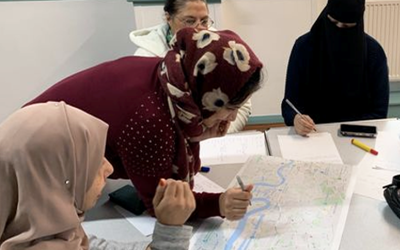It is well evidenced that the first 1,000 days of a child’s life are an important period for both growth and brain development, and that feeding practices developed during this period can impact children’s nutrition, growth, dental health and cognitive development, leading to longer-term health problems later in life.
Children of South Asian origin in east London have a much higher risk of poor nutrition and obesity than the average UK child. The Nurture Early for Optimal Nutrition (NEON) programme aims to optimise infant feeding, care, and dental hygiene practices among children under 2 years old, within communities of South Asian origin in East London. It shifts the power to these communities to better support mothers and carers.
The NEON programme uses the WHO-recommended Participatory Learning and Action (PLA) approach, which involves the formation of community groups facilitated by multi-lingual community facilitators.
The first phase of the project (NEON 1) ran from 2015-2018 and involved formative research and developing the PLA intervention for British Bangladeshi communities in Tower Hamlets in East London. It has had significant impact on the local community and Local Authority early year programmes. It was funded by the NIHR CLAHRC North Thames (our ARC predecessor) in partnership with the London Borough of Tower Hamlets. Find out more about NEON 1 here and in the short film below.
The second phase of the of the NEON project started in December 2019 and is a feasibility randomised controlled trial, to develop the intervention for further South Asian communities across more boroughs in East London. This is funded by the NIHR Academy in partnership with the Tower Hamlets GP Care Group CIC and the London Boroughs of Tower Hamlets, Newham, and Waltham Forest, and supported by ARC North Thames. This phase of the project will run until May 2023.


 Websites
Websites
 PDFs
PDFs
 Publications
Publications
 Other
Other

